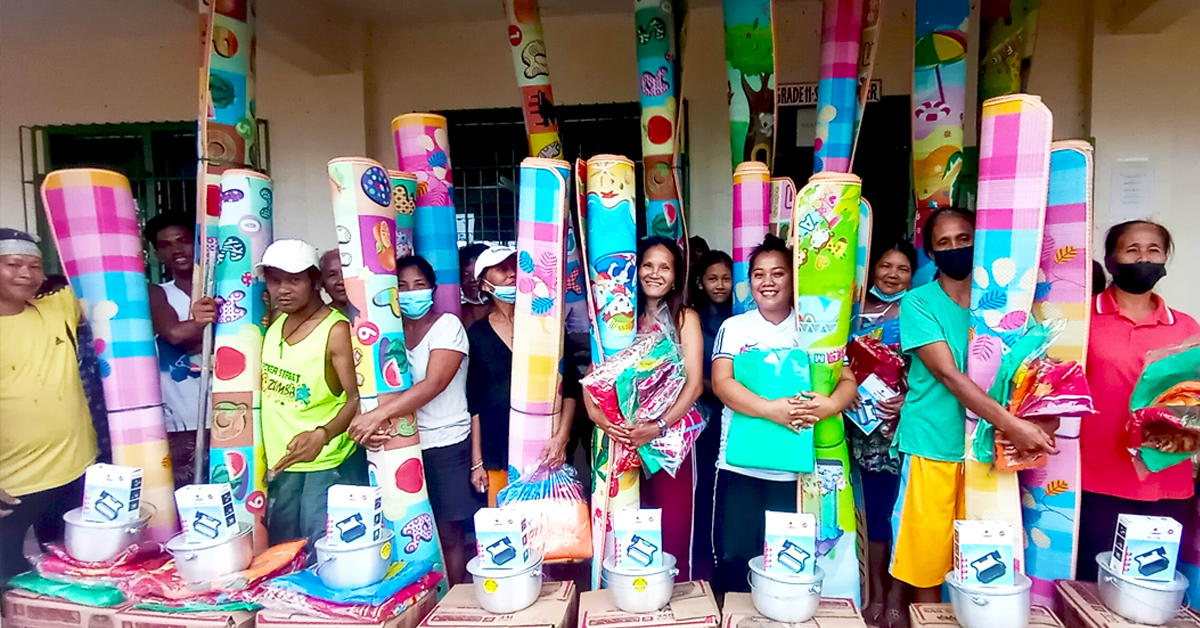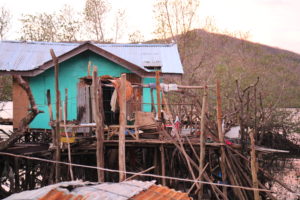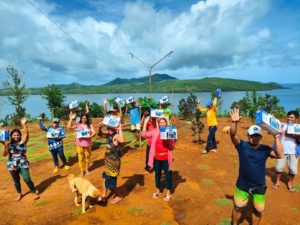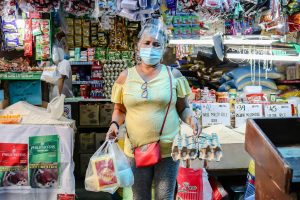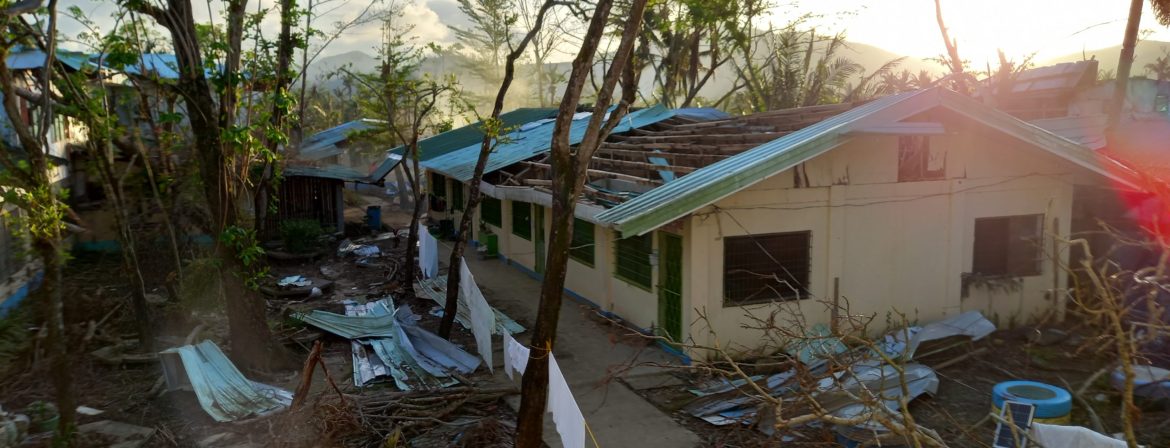
CARAGA Regional Science High School (CRSHS) situated in barangay San Juan, Surigao City, is a home of 26 families who evacuated on December 17, 2021, a day after the landfall of Typhoon Odette. The school opened for evacuees after a local resident begged to one of the teachers because her house tilted and the roof detached making it uninhabitable already.
The evacuees were only given until January 14, 2022 and should immediately transfer to its neighboring school the Surigao City National High School (SCNHS)- a designated evacuation center for the residents of the barangay.
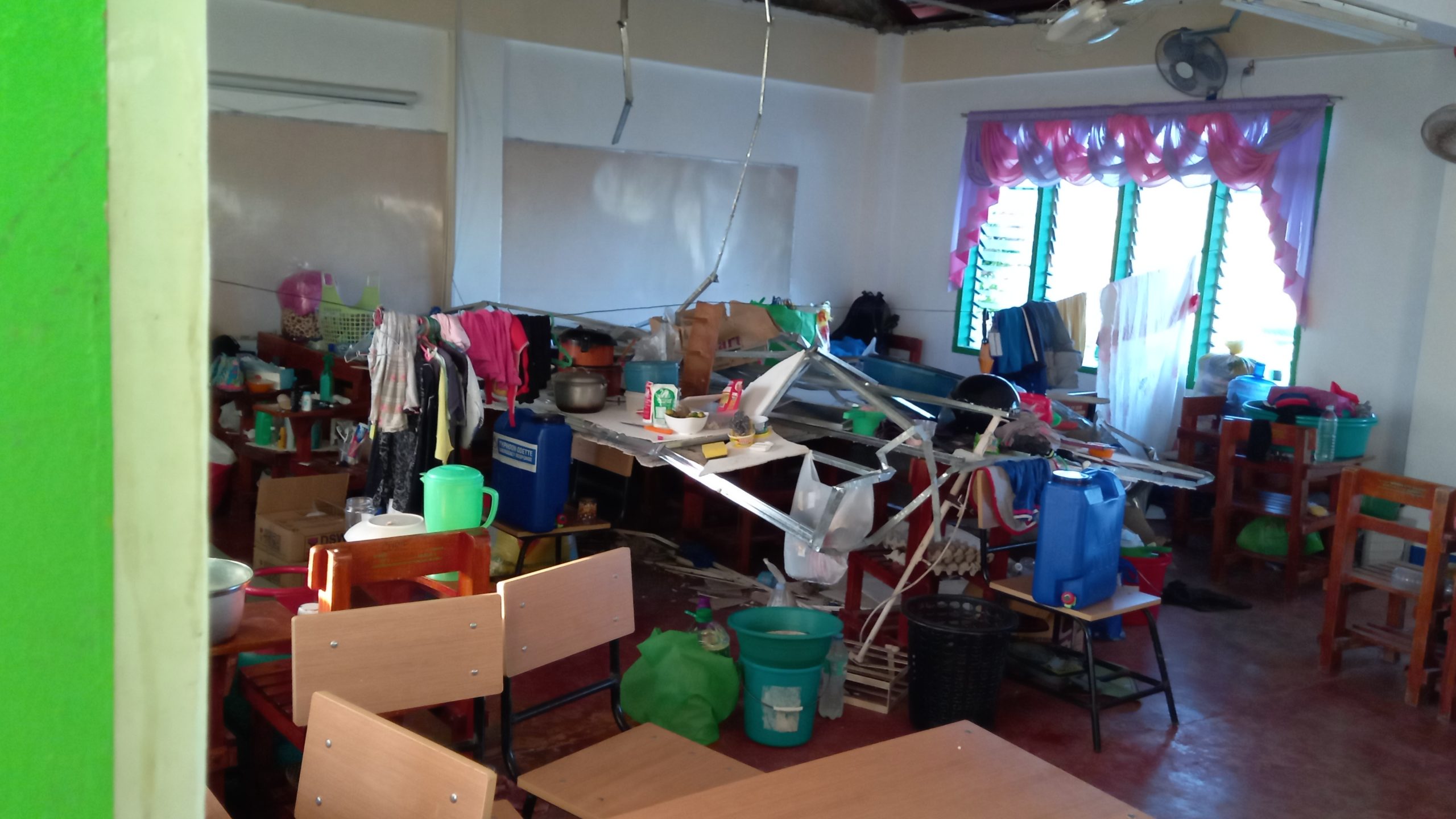
Photo: Cluttered household goods of the Typhoon Odette survivor families brought inside the classroom of CRSHS upon evacuation
‘We were just filming the ravaging winds until…’

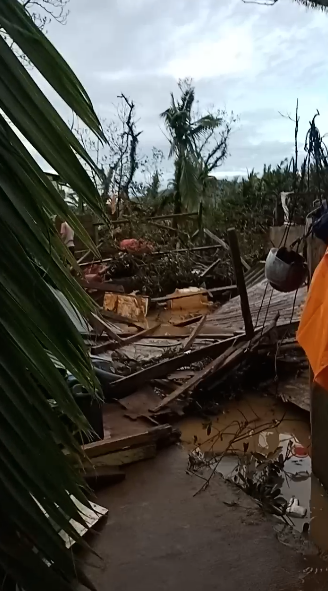
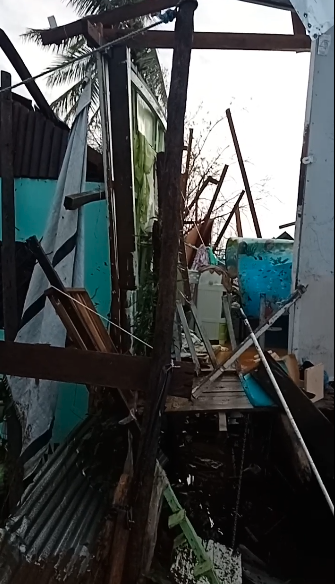
Photos: Snaps from Dorecil Mamac’s videos a day after Odette’s landfall that badly hit Brgy. San Juan in Surigao City.
Dorecil Mamac, 29, a mother of three children aged 4 to 9 remembers vividly the day her family was about to fall down together with their house – a house that Dorecil and her husband funded for years and survived several floods. Pillars were built high, a manifestation that they have adapted to floods in the lowland area.
Due to flood experiences, Dorecil admitted that they were just sitting by the window and filming the ravaging winds and rain without knowing that one of the pillars started cracking. Past one hour and their roof uprooted just then they decided to evacuate. Children were hesitant to leave the house and had to contend strong winds and flying objects.
The house tilted and began shaking five minutes after they left. The roof flown away and landed right in front of the face of her father-in-law. They had to crawl going to the neighboring store and hide. Luckily, they survived from debris as one tin roof also landed in front of them and used it to cover their dilapidated hiding area.
At the peak of coldness and despair, December 17 at dawn, Dorecil and her family wander looking for something that her children can sleep on.

“The local government unit did not allow us to stay in the evacuation gym because of its susceptibility to storm surge,” she said.
With nowhere to go, she and her relatives decided to visit SCNHS but found out that it was already overcrowded. Dorecil’s sister asked one of the teachers of CRSHS if they can stay in the school, fortuitously, they got permitted. However, CRSHS announced to the evacuees that they are just until the 14th of January.
“We were forced to leave because the city did not declare CRSHS as an evacuation center. It just catered us during Odette’s devastation,” she added.
Dorecil vulnerably expressed that with the remaining days before they vacate, “we visited our damaged house and do whatever we can like picking up junk tin roof just to restore it for it to be livable again.”
A laundrywoman’s story…
Similar battle is being fought by Lolita Guardalupe, 37 and a mother of 5, a laundry woman, and a wife of a motor cab driver. Her family’s stomach depends on the income they get from driving and laundry.
“Our motor cab was destroyed so as the three houses where I do household laundry,” she said, adding “we do not have enough savings” to keep them fed for days.
Lolita recounts the day when they have to survive even if they were already in SCNHS evacuation center. December 16, 2021 at 11 in the morning when her family evacuated.
Shattered blades of jalousie scattered all around the floor. Tin roofs smashed like a rumbling thunder. Only the sleeping mat kept them shielded from falling debris and broken glass.
“The room where we stayed was covered by resounding cries and prayers of evacuees.” she said.
Filthy, overcrowded, and unpleasant environment triggered Lolita’s family to vacate SCNHS. Through her boss, a teacher in CRSHS, to whom she does laundry, she and her family including her sister Dorecil were permitted to temporarily stay in the school.
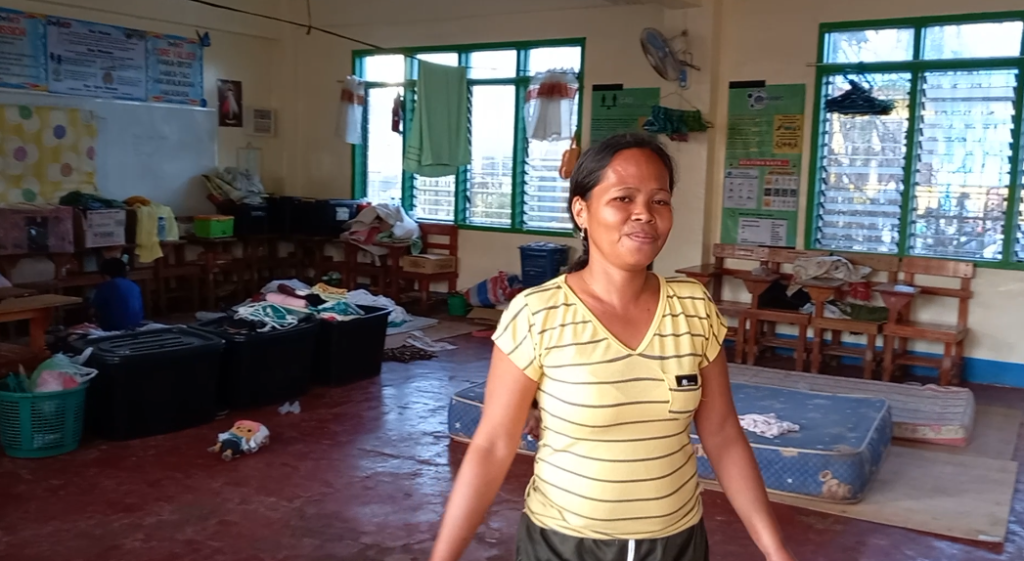
“It was five days after we evacuated when we received our first relief packs from the Department of Social Welfare and Development (DSWD), before that, I borrowed a kilo of rice from my boss who owns a rice business” Lolita added.
These families clamor for temporary shelter, food, and medicines because most of the aid are centered in SCNHS. Lolita thought that aid providers rarely come to CRSHS because of its narrow and winding road. She realized that they need to work for their daily sustenance and to have something to shelter on.
At most six (6) families occupy a room, with “we were like prisoners crowded together,” Lolita said, counting the families with her fingers while ECOWEB team visited their designated rooms and saw the risks of debris falling inside some of the classrooms.
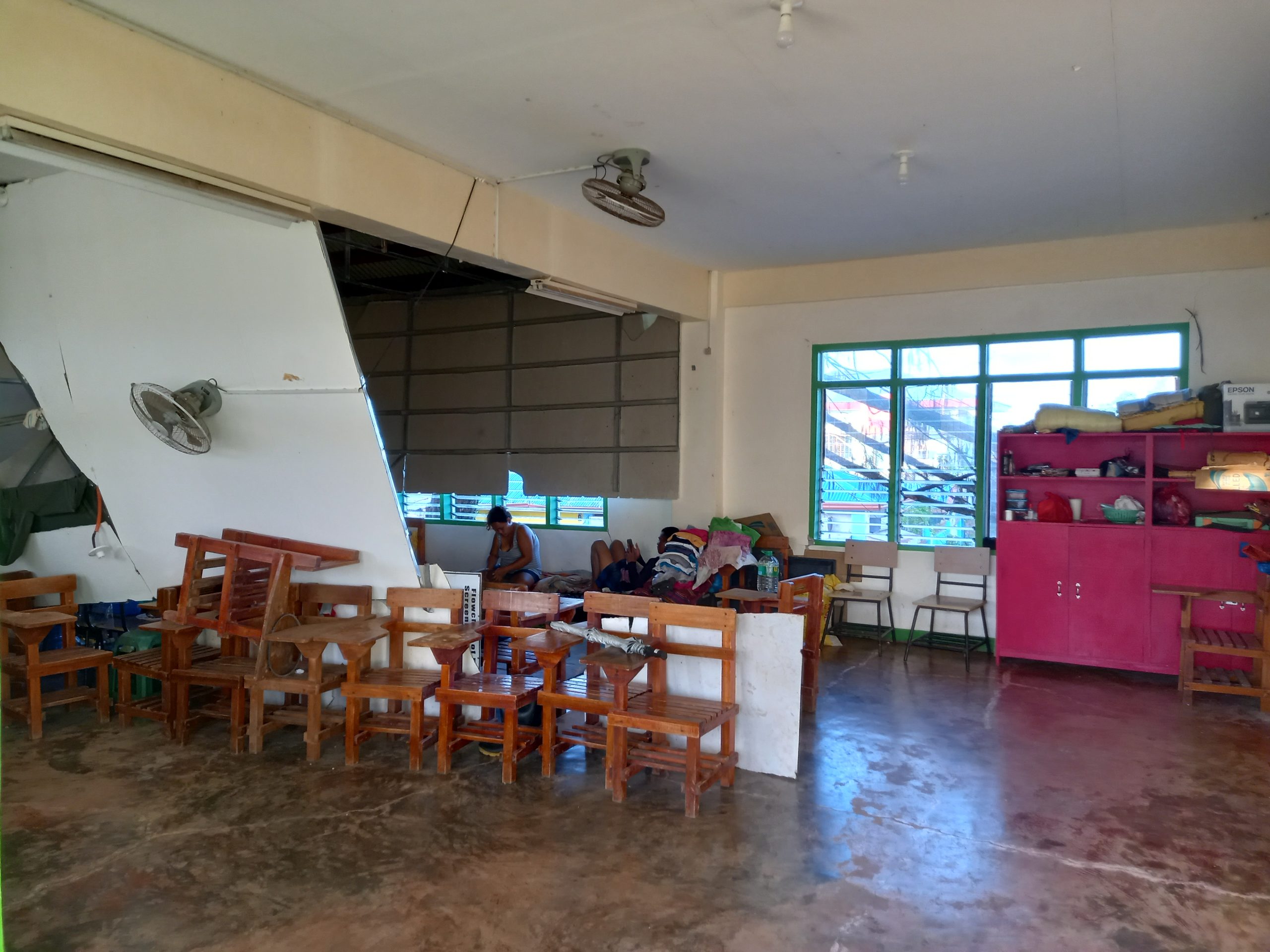
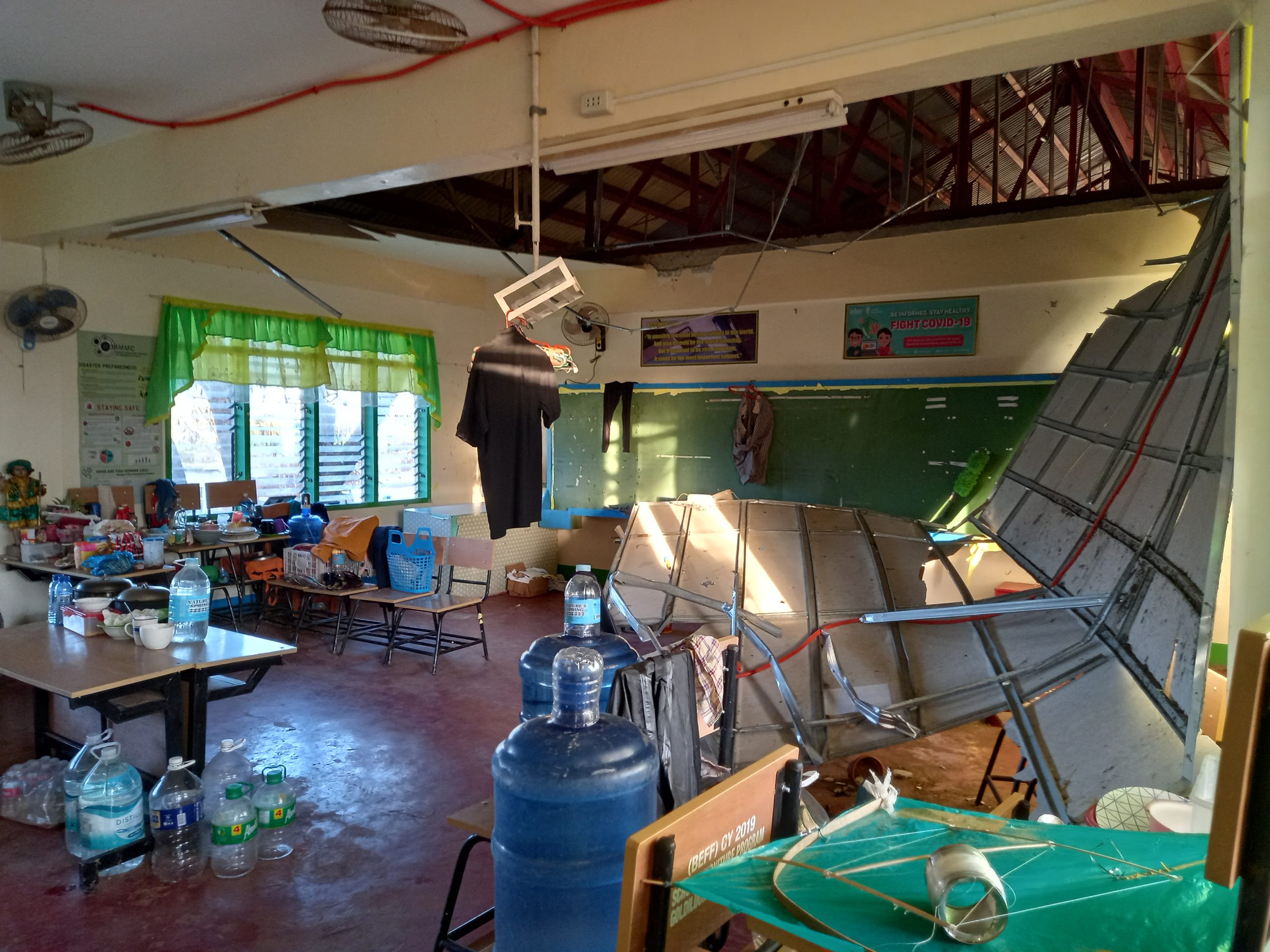
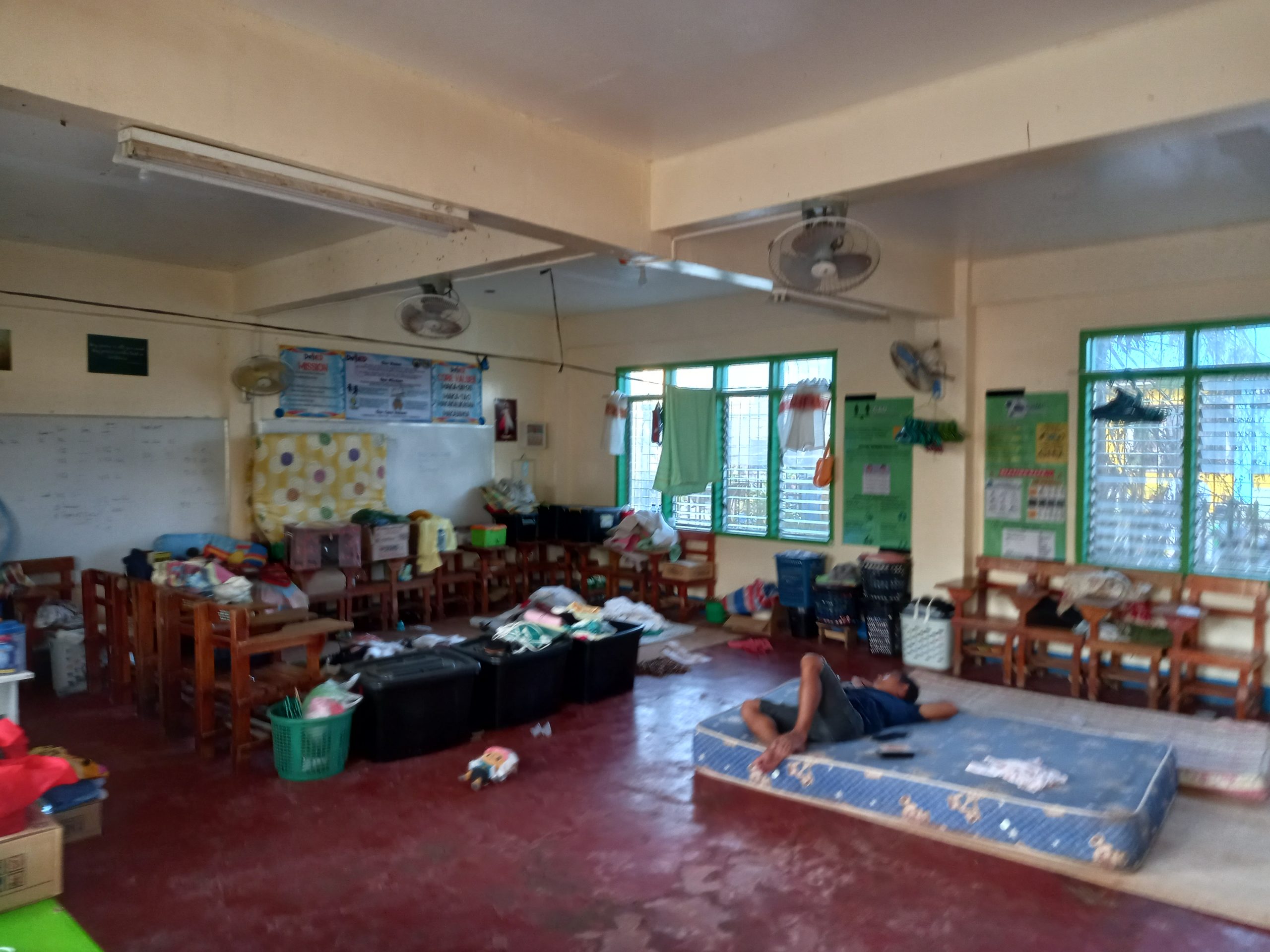
Lastly, Lolita also emphasized that they were also hit by an earthquake on February 2017. She narrated that it is only the typhoon Odette that totally damaged their abode – far from their experience during the earthquake in which only one post of their house tilted and can be repaired with minor expenses.
‘Big changes in relief assistance’
“For the first time, we, the evacuees, made the decision,” said Dorecil.
CRSHS was among the areas recommended by Balay Integrated Rehabilitation Center for Total Human Development (BDEV), one of ECOWEB’s partners in humanitarian response and part of the CLEARNet, that needs more intervention considering a few attentions paid to the evacuees in the area.
ECOWEB conducted a community action planning through a participatory action learning in crisis (PALC) using the survivor and community-led response (sclr) approach in CRSHS last January 11, 2022 which was participated by 26 families.
“Upon your (ECOWEB team) arrival, we were already expecting to receive food packs,” said Dorecil.
Before they leave on the 14th, ECOWEB made sure that these families who are still clueless where to go, have something to bring with them that will contribute to their survival.
All families undergone community consultation and participatory action planning which made them feel entitled of the assistance that the organization has extended. Dorecil was one of the leaders being nominated by the group.
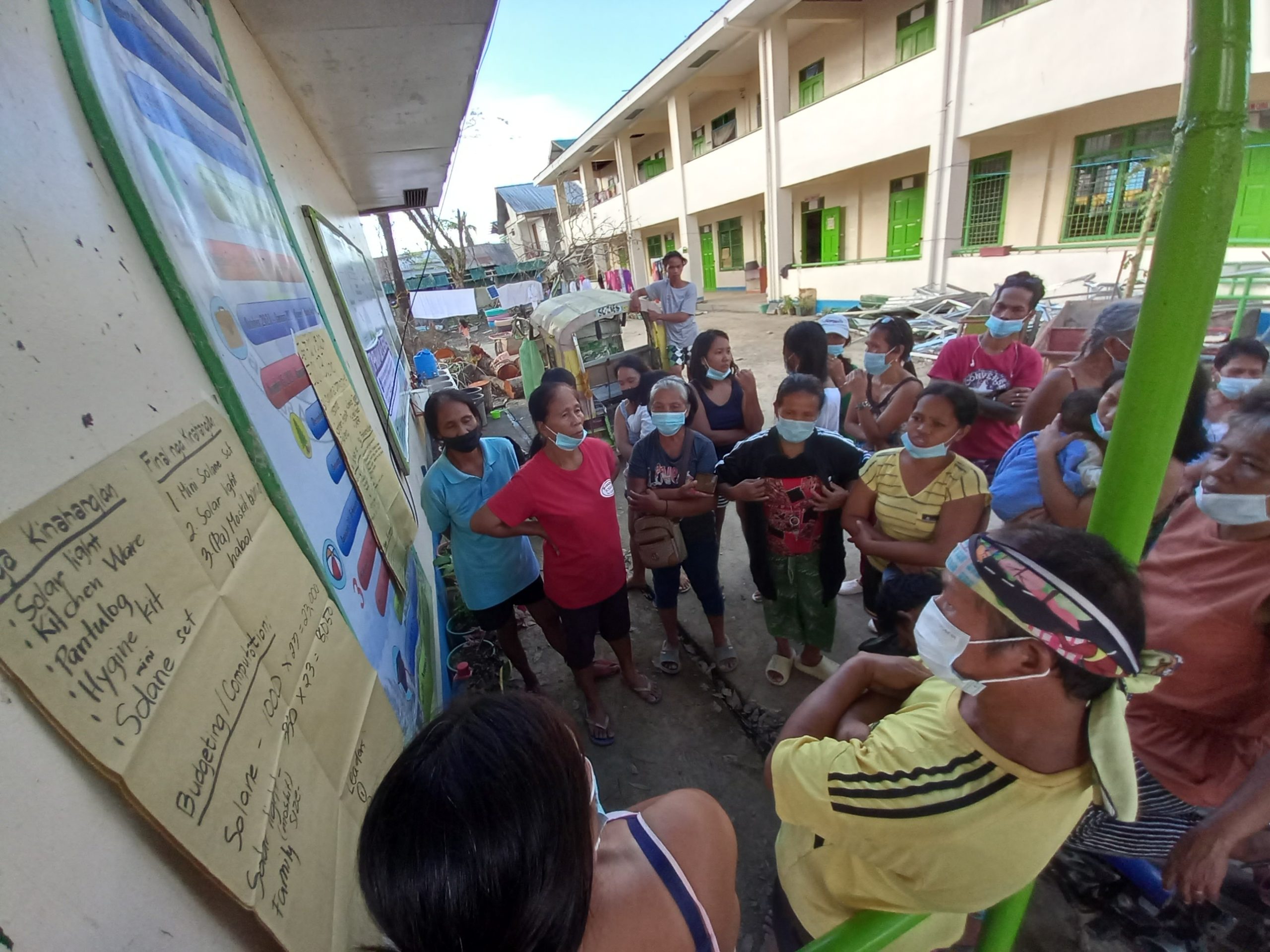
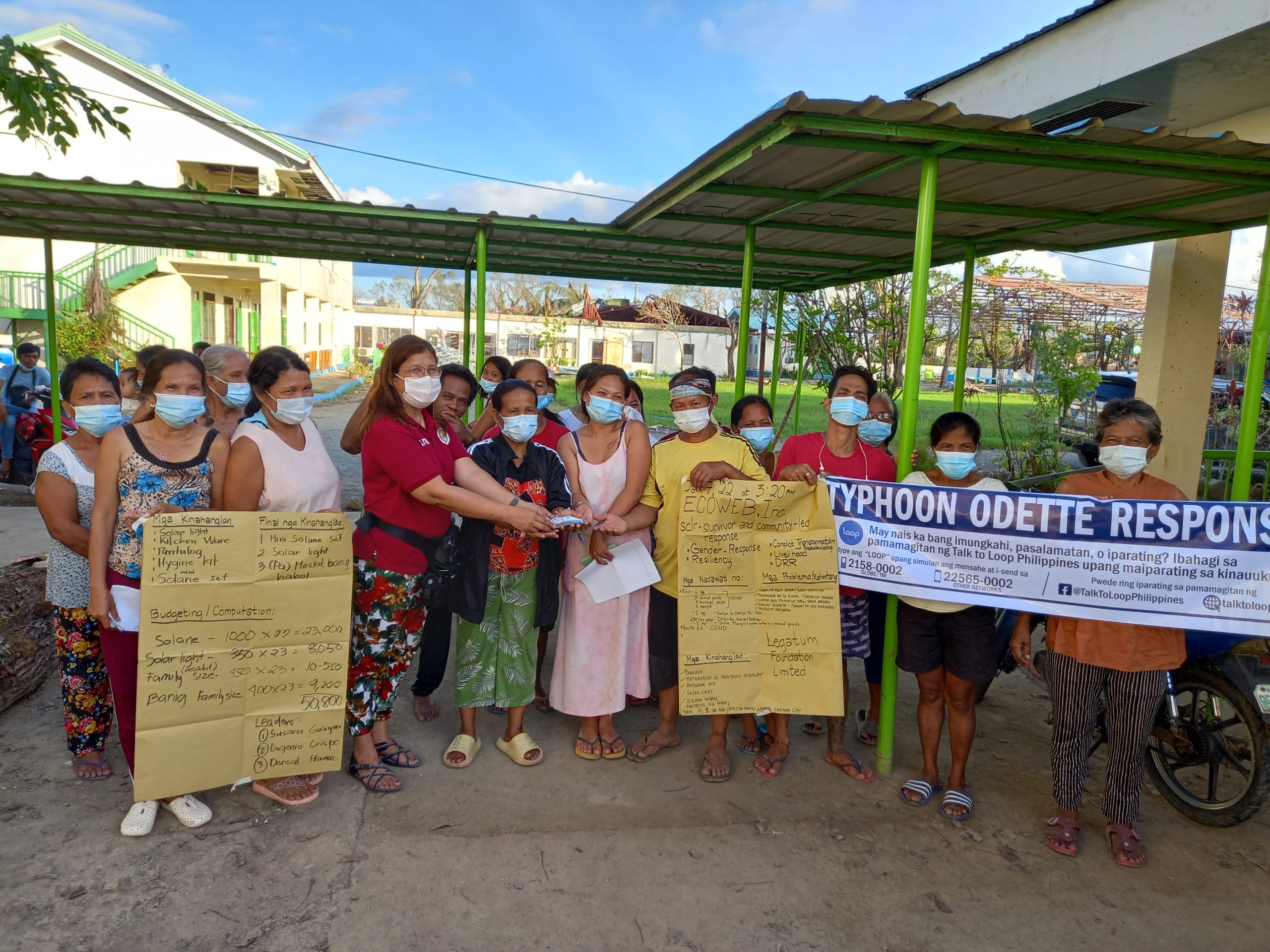
Photos: During the participatory action learning, the participants take the lead in identifying their needs and priorities for early recovery, enumerating the donations or assistance received, and listing the challenges experienced after Odette’s devastation. After the assessment, they were granted with PHP 50,000 by ECOWEB in partnership with Legatum Foundation Limited to purchase their desired needs.
Community’s decision is very important because what we decided are what we really need,” she emphasized. “And we have the opportunity to consult everyone, every family here. Decision was made collectively.” she added.
Together with other two leaders, they headed the planning and prioritization of their needs. They consulted everyone’s opinion and suggestion which led them to agree under the common interest of the body.
A part of the plan was to make women lead the canvassing, purchasing, and liquidation of materials, as she said “it was a form of bonding to us women as we went to several stores to compare prices and try to opt for the cheapest while looking into the products that will last to us,” while men were in-charged in transporting, discharging, and distributing the materials.
“We had small excess of money so we called a meeting and everyone decided to purchase additional cooking pot,” she said as she showed her pot to the staff.
With the ample amount of Php 50,000 extended to them, they were able to manage and prioritize their comfort and convenience as they were about to leave the school.
“You trusted us with this amount, and we assure you that it will be benefited by all,” Dorecil reassured.
Each family received sleeping materials including family-size sleeping mat, mosquito net, and blanket; basic cooking materials such as LPG with single burner, and cooking pot; and solar light with built-in charger.
“I’m glad that I don’t have to get stained with charcoal as I cook food, we don’t need to buy candle every day, I can comfortably sleep on the mat, and won’t get bitten by mosquitos,” Lolita said.
The Solane LPG gas distributor voluntarily delivered the items upon knowing that the money was donated to them. Surprisingly, they were inspired by the process of survivors being able to purchase for themselves. Hence, brought food packs with them to donate to the evacuees. While they demonstrate the proper usage of LPG, they also laid down on the sleeping mat and humorously voiced how lucky the evacuees are to finally lie flat on comfortably.
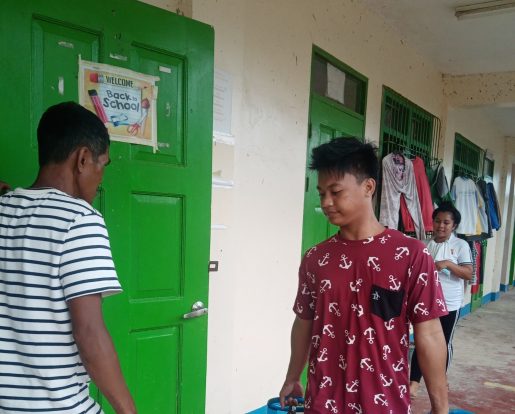
Photo: Discharging and distribution of items led by the male survivors. (Credit: Dorecil Mamac)
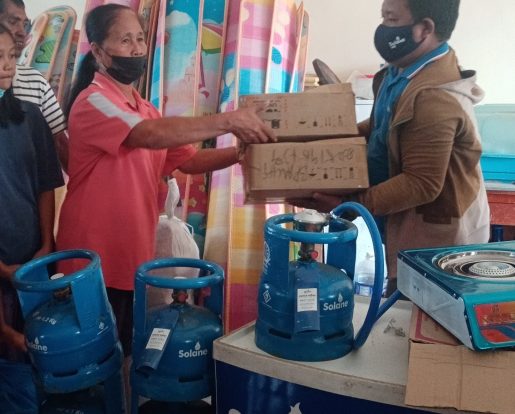
Photo: Distribution of food packs by one of Solane’s representatives after the orientation on safe and proper usage of the LPG tanks. (Credit: Dorecil Mamac)Photo: Distribution of food packs by one of Solane’s representatives after the orientation on safe and proper usage of the LPG tanks. (Credit: Dorecil Mamac)
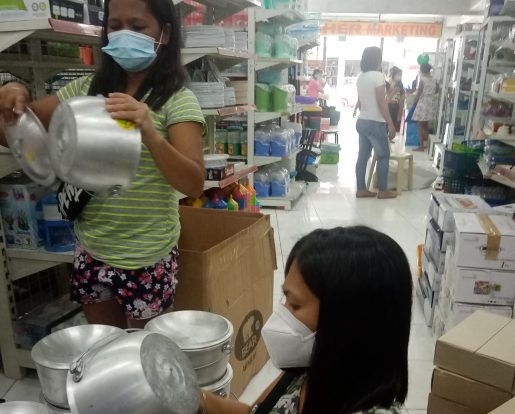
Photo: Purchasing and quality-checking of materials to be purchased led by female survivors. (Credit: Dorecil Mamac)
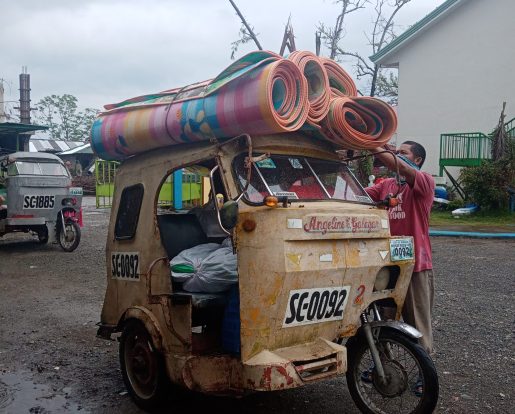
Photo: Public tricycle was paid exclusively by the members of the self-help as their counter-part of delivering the goods in the evacuation center. One of the leaders counts the purchased items to check and make sure that all are bought accordingly. (Credit: Dorecil Mamac)
“It is an overwhelming feeling upon accomplishing the plan right from the beginning of our decision-making until the distribution.” Lolita added.
Dorecil and Lolita expressed that they witnessed big changes in relief assistance and felt that this whole process is new to them.
“The process gave us freedom to decide and not merely as receiver of any relief distribution, then I realized that it is also possible that we get to choose what are essential to our current condition and that we get to work on this as families living together. We were given the right to plan, consult each other, and we can call it as our own.” said Dorecil.
They were used to agencies having to ‘give-and-go’ which is in contrast to PALC wherein they have undergone all of the processes in acquiring the assistance solely identified by them. They reflected that with the process of a community-led intervention, they were able to be hands on and thoroughly points out the necessities of each family affected by Odette.
The decision made by the community is as important as believing in their capacities and giving back their dignity, instilling fairness, ownership, and interdependence among other co-evacuees.
“We were shocked by how unique the process was, we never thought that you entrusted us with cash grant, rest assured that it will never be broken and trust us that this will benefit us for our recovery as we slowly rise from this difficult situation,” said Lolita.
This intervention is made possible through the partnership of ECOWEB with Legatum Foundation Limited.
